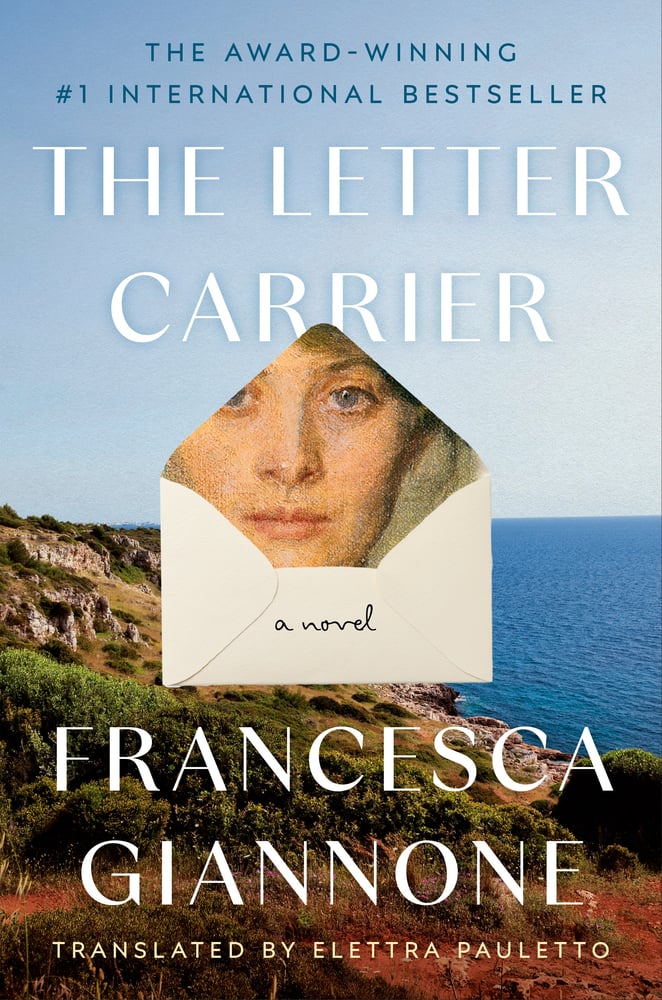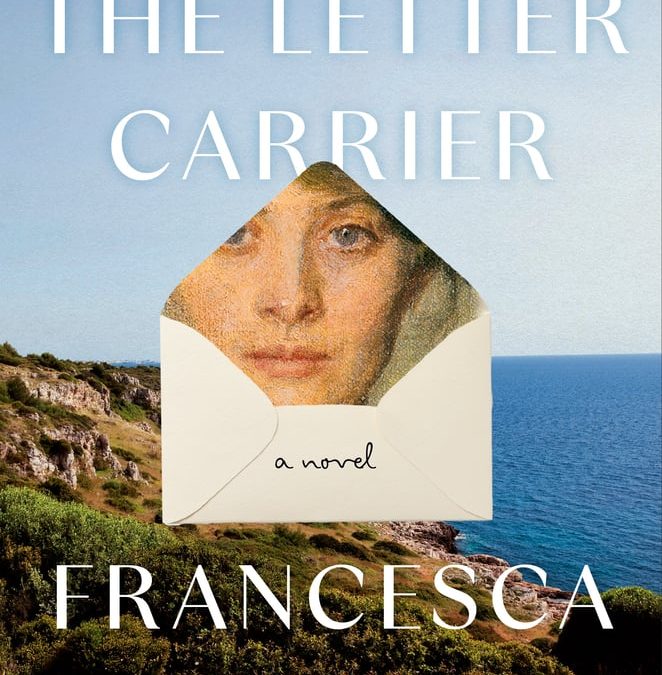
The following is from Francesca Giannone’s The Letter Carrier. Giannone, originally from Salento, graduated in Communication Science and studied at the Experimental Centre for Cinematography. Her debut novel, La Portalettere (The Letter Carrier , has been translated in 39 countries, and was the best-selling Italian novel in 2023. It won the 2023 Premio Bancarella.
Anna left the house early in the morning. She was wearing the blue, red-collared uniform cloak that came down to her ankles, the cap with the inlaid crest of the Royal Post Office, and flat black pumps on her feet. She put the leather mailbag over her shoulder and set off.
Article continues after advertisement
“Good morning, Madam Letter Carrier,” said her neighbor. Still in her nightgown, and with a wool jacket draped over her shoulders, the woman was briskly sweeping her slice of the sidewalk, which measured no more than six tiles or so.
Anna returned the greeting by lifting her cap. “Good morning to you.” She came to the square just as it was beginning to come alive. Michele was loading crates of oranges onto the sidewalk; Mario was sitting on a stool on the corner, shining the shoes of a well-dressed man in a fancy hat. The barber, in his white apron, was smoking a cigarette outside his door, waiting for the first clients of the day. Anna headed for Bar Castello and went in.
“The usual?” asked Nando amiably.
She nodded, peering at two old folks sitting at a table. They were playing briscola, but they stopped dealing the cards to stare at her, whisper something, and elbow each other.
“Here’s your coffee,” Nando said. “Corrected with grappa.”
Anna drank it in one sip, still staring at the two men, who hadn’t taken their eyes off her. They were no longer talking—their mouths were hanging wide open. She smacked her lips, savoring the alcoholic aftertaste on her tongue.
“Thank you, Nando,” she said, leaving the coins on the bar. It amused her to know that after she’d left, the usual comments would follow. It was as if she could hear those two men lamenting the fact that a woman could enjoy a drink so early in the morning.
“Now I’ve seen everything,” she’d heard them say, once.
She entered the post office and greeted Tommaso, who reciprocated with a smile, then Carmine, who stroked his beard and shot her the usual skeptical glance.
She opened the door to the back room and greeted the telegraphists, Elena and Chiara. The “young ladies,” as everyone called them, since neither of them was married. The first was a large, jolly woman with a wide face and a long tongue who lived with her older sister, who was also without husband. Chiara, the younger of the two, was a slip of a girl with thick glasses and a sweet smile who took care of her elderly mother. It’s my job, as the daughter, she explained once, pointing out that her two brothers already had wives and children to look after.
“I brought a cake,” Elena said. “Come on, have a slice with us. It’s almond.”
Anna asked if she could wrap up a slice; she would take it with her in the mailbag and enjoy it later.
She went to the large table in the middle of the office and began her daily ritual of sorting the correspondence based on neighborhood.
Among the letters, packages, and telegrams was a white envelope. The address read Giovanna Calogiuri, Contrada La Pietra, Lizzanello (Lecce). No mention of a sender, just the post office from which it had been sent and the date. Next to that was a stamp featuring King Vittorio Emanuele III; the letter had been mailed from Casalecchio di Reno, in the province of Bologna.
“Where is Contrada La Pietra?” Anna asked, turning the envelope over in her hands.
“Who’s sending mail to Contrada La Pietra?” Carmine asked, surprised.
“I don’t know. There’s no sender.”
Tommaso came over and read, “Giovanna Calogiuri.”
“You mean Crazy Giovanna?” Elena piped up, appearing in the doorway.
“Who is Crazy Giovanna?” Anna asked.
“Someone who’s out of her mind,” said Carmine.
“Nah, she’s just a bit strange. Sometimes I see her grocery shopping in town,” Tommaso said.
“Strange my foot. She’s as dumb as they come,” Elena said. “In school, she was the only one who still couldn’t read after three years. The teacher always made her kneel on chickpeas behind the blackboard. He’d slap her hands with a ruler.”
“Then eventually she just went mad,” Carmine continued. “She would get these demonic fits and throw everything in the air—books, notepads, chairs. They had to kick her out of school. And a good thing they did.”
“Then there was that whole thing with the guy who became a priest . . .” Tommaso muttered.
“Yes, well, that was the final blow! And then she locked herself up there, in Contrada La Pietra, with her dog. Her mother, a saint of a woman, God rest her soul, probably died of heartbreak for all the trouble her daughter gave her. But Crazy Giovanna got lucky: she was an only child, so she got all the money donna Rosalina had squirreled away from her job as a cook for the Tamburinis. I bet that woman doesn’t even bathe. When she comes to town, you can smell her from a mile away,” Elena said, holding her nose.
Anna lifted an eyebrow. A little dazed by all that gossip, she asked if someone could just please explain how to get to Contrada, as she was already late. She learned that Giovanna’s house was on the edge of town, where the olive trees grow; this was going to be hard work on her poor feet. She knew that that night she’d have to soak them in warm water longer than usual. She couldn’t say how many miles she’d walked in those first six months; all she knew was that the soles of her feet were covered in calluses and constantly hurt.
She slipped the letter into the back of her bag; it would be the last stop of the morning. She slung the mailbag over her shoulder and left the office. As soon as she stepped out, she saw Carlo standing outside Bar Castello, absorbed in reading the paper with a cigar between his teeth. They hadn’t seen each other yet that morning. He had been in the bathroom as she was leaving.
Anna glanced at her watch. Antonio had given it to her when she got the job, back in May. She loved the watch. It had a black leather strap and a rectangular dial with Arabic numerals. It was unusual but simple, just as she liked it.
I really don’t have time to stop and talk to Carlo, she thought. Nor had she any desire to. She’d see him later at home. What difference did it make? Since her birthday, all they did was squabble over the smallest things. They’ll never take you. Carlo’s words still rang in her ears even though she’d patently proven him wrong.
Her level of education had made all the difference: The other two candidates hadn’t advanced past fifth grade. He should be proud of her. She’d done it, for heaven’s sake! Yet Carlo didn’t even seem to care; he had known that she didn’t listen to him, she did things her way, and yet he still couldn’t forgive her for it. He ended up pointing his finger at her along with everybody else. She felt like everyone—with their chorus of You’ll never make it, But you’re a woman, It’s not a job for women—was just waiting to see her fail. To restore the order of things.
Anna felt a sudden sense of fatigue and quickly crossed to the other side of the street.
Carlo looked up from his paper, lighting his cigar as he noticed her walking away. She wasn’t that far; he could have just called out her name to make her turn. But he didn’t—because Carmela was waiting for him, and he was already late. He folded the paper, dropped it onto a table, and walked to his car.
He drove to the corner near Carmela’s house and stopped there for a moment; once he was certain that Nicola’s car was gone, he turned onto her street. Carmela had assured him that her husband left very early to take their son to school before going to work, but Carlo always peeked. He parked on a little side street, a dead end where no living soul ever passed except for a colony of stray cats. He got out of the car and continued on foot. He found the door ajar, like every morning. He pushed it, entered, and closed it behind him.
“It’s me,” he said.
Carmela came down the long hallway in her white silk nightgown and lunged in to kiss him.
“You’re late,” she said.
“Forgive me. Roberto had a tantrum this morning, and it took me longer than usual to bathe and dress him. I dropped him at Agata’s and came straight here. To you,” Carlo lied, hugging her hips.
__________________________________
From The Letter Carrier by Francesca Giannone Translated by Elettra Pauletto Copyright © 2025 by Francesca Giannone. Published in the United States by Crown, an imprint of the Crown Publishing Group, a division of Penguin Random House LLC.
